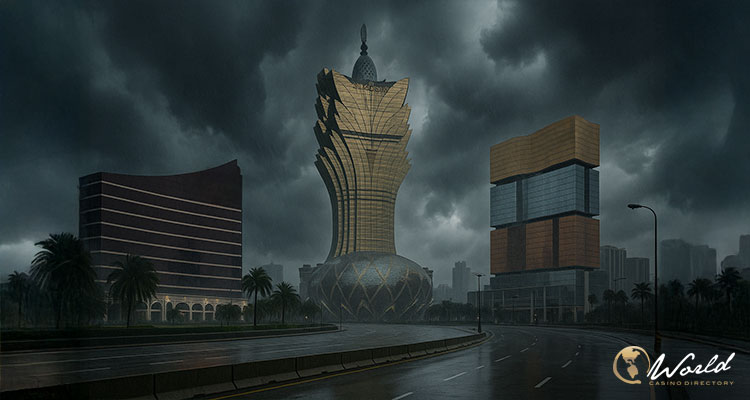The announcement was made Monday by Secretary for Economy and Finance Tai Kin Ip following a cross-departmental meeting led by Chief Executive Sam Hou Fai. Ragasa, described by the Macao Meteorological and Geophysical Bureau as a “super typhoon,” is expected to strike most forcefully on Tuesday and Wednesday, September 23 and 24.
Casino Closures and Worker Safety
Tai Kin Ip, whose portfolio oversees the casino industry, explained that public safety would take precedence. Advance notices will be given to operators to safeguard both gaming staff and visitors. “When the Ragasa warning signal is raised over No. 8, casinos will close,” Tai confirmed. He also urged employers to adopt flexible schedules for staff during and after the storm to allow safe returns to workplaces.
Macau casinos have rarely been closed in their history, but past typhoons have demonstrated the potential for devastating impact. In 2017, Typhoon Hato killed 10 people, injured 244, and caused an estimated MOP$12.55 billion (US$1.57 billion) in economic losses. Power outages crippled most casinos, bringing gaming to a halt. The following year, when Super Typhoon Mangkhut made landfall, Macau’s casinos closed for the first time since the industry’s legalization in 1847, remaining shut for 33 hours. More recent closures occurred during Typhoon Saola in 2023, as well as temporary shutdowns in 2020 and 2022 during the pandemic.
Forecasts indicate that Signal No. 8 could be raised as early as Tuesday, September 23, afternoon. Officials have warned that Ragasa could bring conditions comparable to Hato and Mangkhut, including destructive winds, widespread flooding, and extensive infrastructure damage. As reported by Macau Business, the Meteorological Bureau has already advised that there is a “high probability” of Signal No. 3 being raised overnight, followed by Signal No. 8 the next day.
An orange storm surge alert, the third level on Macau’s five-tier system, will be hoisted on Tuesday, meaning floodwaters could rise between 1 and 1.5 meters. Secretary for Security Wong Sio Chak cautioned that this may escalate to a red alert, predicting water levels as high as 2.5 meters above road surfaces. He revealed that 27 public car parks in low-lying areas will close once evacuation plans are triggered, alongside the city’s 18 private lots.
Wong stressed that evacuation measures are ready for residents in vulnerable districts, and urged cooperation with security forces. Authorities are coordinating closely with their counterparts in Hong Kong and mainland China to synchronize responses.
Transport and Infrastructure Disruptions
Disruption to transportation is already unfolding. Ferry services between Macau and the Chinese mainland have been suspended, with the Hong Kong–Zhuhai–Macau Bridge set to close at 3pm Tuesday. The Macau International Airport anticipates around 250 flights will be affected, with nearly all services cancelled on September 24. “After 4pm on September 23, flight operations will be significantly reduced, with virtually no flights taking off or landing on the September 24,” the airport operator said. Normal schedules are expected to resume on September 25.
Bus and light rail transit systems will also stop when Signal No. 8 is in effect, while cross-border travel at Hengqin will be temporarily halted. Authorities pledged to maintain essential services such as water, gas, telecommunications, and power, while urging residents not to spread rumours online.
Chief Executive Sam Hou Fai outlined a three-stage contingency plan covering prevention, immediate storm response, and post-typhoon recovery. Secretary for Administration and Justice André Cheong added that government services would either operate at reduced capacity or close entirely if the typhoon’s effects prove too severe, with civil servants excused from duty during the emergency.
The preparations come at a time when Macau is experiencing a tourism surge. The Statistics and Census Service reported that August 2025 brought a record 4.2 million visitors, a 15.5 percent year-on-year rise. More than 3.25 million of those arrivals were from mainland China, while Southeast Asian markets also showed strong growth. Yet with Ragasa now bearing down, the city that just celebrated a historic tourism milestone faces the prospect of empty casinos and shuttered resorts until the storm passes.
Authorities continue to urge residents and businesses to stock up on provisions for at least three days, brace for potential power outages, and secure homes and workplaces against damage. Ragasa, expected to pass within 100 kilometers of Macau, is shaping up to be the city’s most severe test since Mangkhut in 2018.


